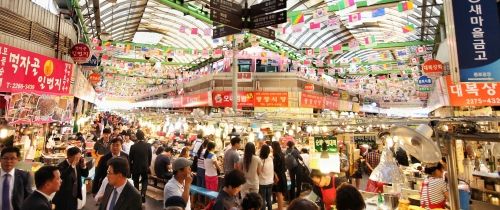
FAQs - Teach in South Korea
Topics on This Page
Application Process | Job Placement | Living and Working | Travel and Arrival
Application Process

It depends on the school type. For public schools, an ESL certification is required unless you have an Education degree or teaching license. Not all private schools require a certification, but they all strongly prefer teachers with certificates. You would be at a serious competitive disadvantage trying to secure a teaching position without it (particularly in major cities).
In Korea, ESL teachers have a high-level of responsibility which includes lesson planning and class management. For these reasons, our regular program in Korea includes CIEE’s 150-Hr TEFL Certificate as a built-in feature! The 150-Hr TEFL Course is 11 weeks long and new sessions begin every two weeks. Our TEFL team will enroll you in a session after joining the Teach in South Korea program.
If you already have TEFL, an Education degree, or a teaching license, you can apply to our Basics program, which includes the same amenities, just without TEFL.
As long as you meet the eligibility requirements (see our program pages for these), CIEE has a high acceptance rate. We are here to help as many candidates teach abroad as possible!
While there are video interviews for both school types, we share detailed tips & resources in our online courses! Candidates should be professional and demonstrate an enthusiasm for teaching abroad.
Yes, you can apply in the final year of your degree program. Please submit a letter from your Academic Advisor or Registrar to confirm your anticipated graduation date, degree type, and diploma timeline. You can upload this to the DIPLOMA task in your CIEE application. Be sure to check your diploma timeline as you’ll need this for your visa.
Our fee-based program means you can expect the highest level of service and assistance. Unlike recruiters who rely on commissions from schools, CIEE works for you, and puts your interests first. Our years of experience and firsthand advice from alumni will help you have a successful experience. At every step of the process, the guidance and support that we offer sets us apart from the rest.
For candidates who will be taking our TEFL course as part of the package, the ability to combine that certification and your job search preparations under one roof is also a great benefit!
Yes, two recommendation letters are required. Letters must be written by work supervisors (past or present) or college professors. If your recommender would like to keep the letter confidential, they can the recommendation letter to TEACH@ciee.org.
Letter must be dated within the past two years and address why you are a good fit to teach English in another country. Letters should have a professional appearance, your full legal name, and the recommender’s contact information. If you are interested in public schools, be sure to review the recommendation guidelines from EPIK.
CIEE offers scholarships for our Study Abroad and High School Abroad programs, but because our Teach Abroad participants receive compensation while on program, we’re not able to offer scholarships for our Teach Abroad program fees.
Job Placement
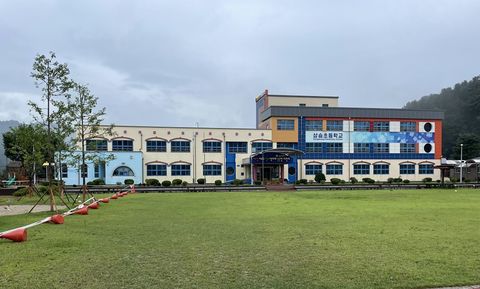
CIEE can help you pursue either school type! Our experienced staff can advise you while you are deciding which is your top choice. For an in-depth comparison, be sure to visit our Public vs. Private School page.
Public school positions are competitive, so we’ve created our EPIK: Ready, Set, Teach! course designed to walk candidates through EPIK’s application process step-by-step. The course includes advice from our experienced staff and alumni, recorded videos, and guidance on documents & next steps. If you are thinking about public schools, we highly recommend you read our Public School Timeline and apply early.
Private school interviews are arranged by our placement team. Our team works with reputable employers to help secure you a position, keeping your preferences in mind. We’ve created our online Hagwon Hacks Guide to prepare candidates for our private school hiring season. Be sure to read our Private School Timeline and get started on your application.
Teachers are placed all over Korea! Take a look at the location charts that show public school teachers and private school placements. Applicants can note their location preferences in CIEE's application portal. While CIEE cannot guarantee location requests, we do our best to honor location preferences. For an overview of major cities and provinces in South Korea, be sure to read the Destination South Korea Guide.
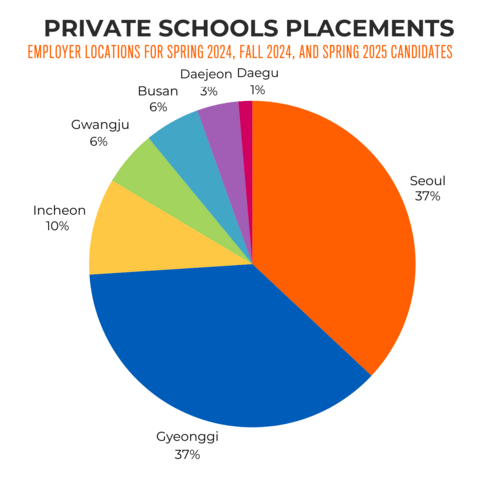
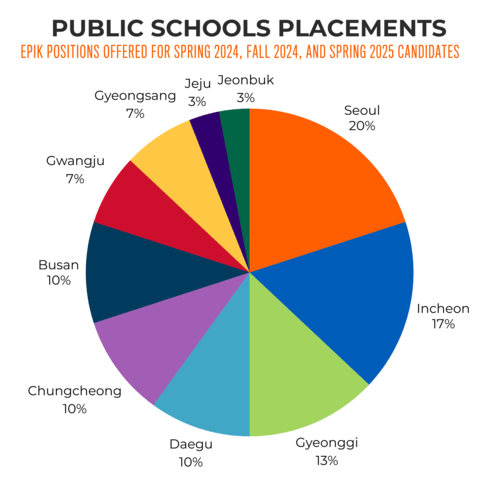
Yes, we have placed friends and partners at the same employer and/or in the same city!
For public schools, married couples may request placement and joint housing together. Friends & partners should apply as early as possible to increase your chances of being placed in the same location (Office of Education).
For private schools, it’s possible to work at the same employer or same city as a friend, spouse, or unmarried partner.
In South Korea, teaching contracts are a 12-month, 365-day commitment. Paid vacation days and sick days will be noted in the contract. If your job performance is satisfactory, the employer will invite you to renew your contract for another year!
Living and Working
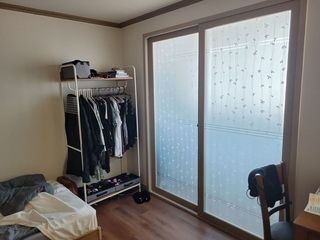
All South Korean employers provide rent-free housing for teachers. Housing is typically a standard studio or one-bedroom apartment with basic furnishings: bed, mattress, fridge, AC, washing machine, and small stovetop. Employers cover the cost of rent, and teachers pay for utilities, which average roughly $150-250 USD/month.
Please know that these are not luxury units – they are ordinary Korean apartments. They have the necessities for you to live comfortably, but some are newer than others. When apartments turn over to a new occupant, schools arrange for them to be cleaned. For maintenance issues, you will be able to ask school management to help you remedy the situation. For a detailed overview, be sure to read this participant blog: Housing in South Korea: What Types of Accommodations to Expect.
Korea has a humid climate, and many buildings are prone to mold issues, which can be cleaned but can’t always be eliminated 100%. Teachers are encouraged to do as the locals do, using ventilation, dehumidifiers, and periodic cleaning to keep mold under control.
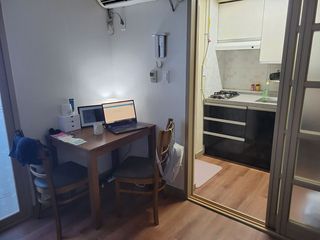
It depends on the employer and school type! Public school teachers will have a set curriculum given by the Office of Education. Private school teachers may have a set curriculum or general teaching outcomes given for the semester or upcoming year.
Regardless of the curriculum, both public and private school teachers will be responsible for lesson planning. More information and teaching resources will be noted after arrival.
Wherever you are placed, expect to have the role of a full-time lead teacher, responsible for lesson planning, classroom management, and student evaluation. At a public school you will often have a Korean co-teacher to help with classroom management, as those classes are usually around 30 students. Private schools have smaller classes, usually around 8-15 students.
It can feel daunting for someone without teaching experience to step into the role of a classroom teacher. The skills and training from the CIEE TEFL 150-Hour Certification course will help you, and make sure to be extra energetic and enthusiastic in the classroom. If kids are having fun, it’s easier for them to learn!
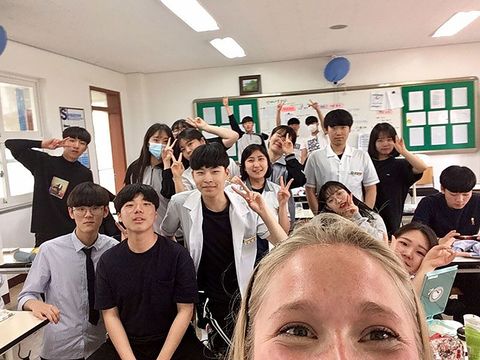
South Korea offers excellent food, entertainment, and pay, but it does have a heavier workload than some of our other programs. You’ll be a lead teacher, and the expectations for your lesson plans, classroom skills, and enthusiasm tend to be a bit higher, which is one of the reasons a TEFL certification is required if you don’t have an Education degree.
In Korea, workload is measured by the number of hours spent teaching in the classroom each week: 20-25 hours at public schools, and 30-34 hours at private schools. Beyond those hours, expect to spend additional time on meetings, free periods, lunch supervision, special events and lesson prep. For private schools, first-year teachers typically need to spend significant additional time on lesson prep after hours, since their daily schedules are quite full and they don’t have free periods during the day to plan.
Teaching in Korea is a great way to maximize your income, but if you’re looking for a lighter workload and OK with a smaller salary, check out our teaching programs in Thailand, China, or Spain.
Once you arrive at your school, a colleague will help you set up a local bank account, which is usually ready 3-5 weeks after you arrive. Most teachers are paid by direct deposit, but your first paycheck might be in cash if that’s not ready yet. You can continue to use your U.S. bank or credit cards abroad, but you will need to contact your home financial institution to discuss fees, travel alerts, and security.
Yes! South Korea has one of the highest starting salaries for entry-level English teachers, when you consider that rent-free housing is already provided. If you’re living like a local, other costs of living are significantly lower than in the US. This means that you can take care of meals, groceries, utilities, internet, cell phone, and local transportation, and still have plenty of money left over each month. You can use it to plan amazing trips, make student loan payments, or just save it up and bring it back with you!
Expectations vary between schools. Some are very casual (jeans and a t-shirt), while others look for smart casual. Tattoos should be covered while teaching and non-ear piercings may need to be taken out or covered. Most schools would expect men to tie back long hair and be clean-shaven, but some may be flexible about this once they get to know you.
No. It’s very difficult to “import” an animal into South Korea, and then re-import them back to your home country when you return home. Employers and landlords won’t allow you to have a pet in your small studio apartment. You’ll need to find someone for your pet to live with while you teach abroad.
Questions about Travel to and Arrival in South Korea
Due to varying start dates, CIEE is not able to organize an orientation upon arrival, but there are opportunities to attend in-country events:
Public School Teachers will participate in a multi-day, in-person orientation organized by EPIK. EPIK will meet participants at the airport and transfer teachers to the orientation site. Past participants have described this event as helpful, and a great way to meet other foreign teachers when you first arrive.
Private School Teachers will typically have a limited few-day training geared for incoming teachers. More than likely, there will be other foreign teachers at the school and participants may have the opportunity to shadow the teacher they are replacing or fellow colleagues.
After participants have arrived, our local staff organizes a Weekend Retreat in Seoul! We'll provide hotel, meals, train tickets for distant teachers, and an opportunity to meet fellow participants and CIEE staff. We'll have discussions about successes & challenges and share tips and strategies on how to get the most out of your experience. For a sneak peek of the Retreat, be sure to read our blog: A Weekend in Seoul.
South Korea periodically finds itself in the headlines because of posturing by its northern neighbor, but in reality it has enjoyed peace and stability since 1953, when fighting ended in the Korean war. At CIEE, we use our international connections and resources to monitor safety and security in all of our destinations, relying on public and non-public information sources. At this time, we are confident that South Korea is a safe country in which to live and teach, and will remain so for the foreseeable future. No place is completely risk-free, whether at home or abroad, and it’s important to follow common sense practices, such as not walking alone after dark, keeping your passport in a safe place, and being careful around roadways and motor vehicles.
For more information about safety in South Korea, please consult the State Department’s country page, and consider enrolling in the STEP program, which can be helpful for concerned family members as well!
Public school employers will give teachers 1.8 million KRW as an "entrance allowance" and 300,000 KRW as a “settlement allowance” to help offset travel-related costs. This will be given within one to six months after arrival.
Private school employers will reimburse teachers for all or most of their one-way flight to Korea. Some employers may opt to pay for their return flight instead. This detail will be noted in the teaching contract.
Upon successful completion of the contract, teachers can expect severance pay and pension refund (dependent on country eligibility). If a teacher decides to renew their contract, they may also receive a renewal bonus as well.
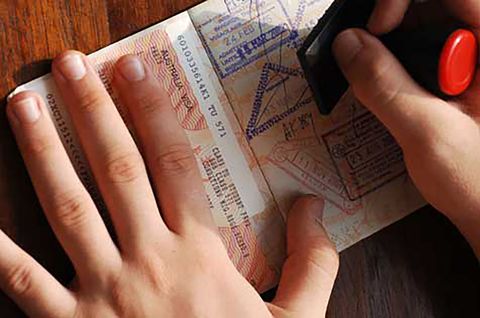
Ready to Change Your Life?

More Information
Have more questions? To see dates and deadlines, visit the Program Overview page.